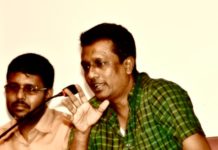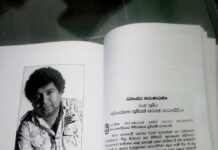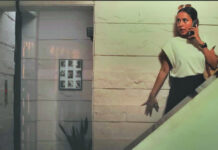Renata Salecl
Now that Australia has made its choice – sort of – The Philosopher’s Zone looks as the very idea of choice. Much more than previous generations, we can pick and choose where we live, how many children we have or don’t have, what type of bread we would like to eat and even what our gender will be. But the flipside is that that these choices don’t always seem to fulfil us. This week we look at the connections between choice and contemporary capitalism and freedom, and the ideologies that underpin all three.
Alan Saunders: Now that the nation has made its choice, sort of, we thought it would be a good idea to look at the very concept of choice. Much more than previous generations, we in the West can pick and choose where we live, how many children we have, or don’t have, what type of bread we’d like to eat and even what our gender will be.
But the flipside is that these choices don’t always seem to fulfil us. Maybe, we begin to suspect as we try to come to grips with this dismaying array of choice, this abundance isn’t all it’s cracked up to be.
So today on The Philosopher’s Zone, we’re going to look at the connections between choice and contemporary capitalism and freedom and the ideologies that underpin all three.
Hi, I’m Alan Saunders and my guest this week is the author of a new book called simply Choice, which analyses the dilemmas of choosing in the 21st century.
Renata Salecl is a Visiting Fellow at the London School of Economics. She’s also a Senior Researcher in Criminology at the University of Ljubljana, Slovenia. Renata, welcome to The Philosopher’s Zone.
Renata Salecl: Thank you.
Alan Saunders: Let’s begin with you in a condition of rational choosing. Tell us about what happened to you in the cheese shop.
Renata Salecl: Well when not long ago I was in New York, and I wanted to bring a special present to a dinner party, I decided to buy cheese and in this enormous shop there were so many different types of cheese that I got completely lost. But the interesting thing was that I felt anxiety. First, I didn’t know what to choose; second, I was afraid that I’m always forgetting the names of cheeses that I actually like. And then I decided I will ask the guy who was working there to help me. And then I felt anxiety over his advice, because I was feeling that he was trying to sell me the most expensive cheese.
So at the end I decided to randomly pick up five types of cheese and just went out feeling that whatever I would choose probably would not be the right thing. And that experience started me to think why this anxiety? In some way I was anxious in regard to lacking the knowledge, of being inadequate in my choice. Second, I was anxious: how will other people regard me, like my friends? What will they think about my choice? I was also thinking how does this guy who advises me about the cheese, regards me as a completely stupid person asking for advice. And then I was thinking: Am I really making the choice? Isn’t it already the set-up? How they are laid out? Advise the person who’s giving me, already forcing me make some decisions.
So then there’s a question for me, became why a simple consumer choice becomes so anxiety-provoking and then I started realising that it is nowadays this overwhelming feeling that everything is a matter of choice and that you can make it rationally it is behind anxiety, a feeling of guilt and inadequacy.
Alan Saunders: And you were also concerned weren’t you, about how your choices would be judged by the people to whom you were going to be serving the cheese?
Renata Salecl: And that’s always part of choice. It’s rarely an individual matter. The question who are we for others? Only then I kind of understood a little vignette which a friend of mine, a famous law professor in New York told me that he’s always anxious when he orders wine in the restaurant. He said, ‘I’m afraid that other people would laugh at me. If I buy too-expensive wine, they will think I want to show off; if I buy too cheap they will think I’m a cheapskate.’ So he decides always to buy something in the middle, and to pay for it in order to deal with this feeling of anxiety and guilt.
Alan Saunders: Now you’re arguing aren’t you, that we live in a world, not a world of limitless choice, but a world in which society’s dominant ideology depicts us as having endless choice, it depicts us as being able to choose from a presumably infinite variety of opportunities.
Renata Salecl: Yes, and that’s the problem today. On the one hand, you have the ideology which perceives everything on our lives as a matter of choice. Our sexual orientation, to have children or not, ageing, dying, everything is supposed to be a matter of choice. If you lose a job then you blame yourself, not the corporation because it’s your choice. But Preality is the opposite. There is a huge divide between people who actually can make some choices, and there’s a tiny minority of them, and majority of people who are having less and less choice, fewer and fewer people for example have the possibility to choose the best health providers. But the idea of health as a matter of choice, it’s overwhelming.
I couldn’t believe that Americans for example embrace a rather modest proposal that the Obama Administration had in regard to universal health care, when the majority of people really have no choice. Only a tiny percentage of people have enough money to make their choices. And when we speak about choices, we always perceive a person as a consumer who has needs, as a consumer who has the means to make choices.
Alan Saunders: But isn’t the notion of choice intimately linked with our idea of freedom? We think that freedom involves having an ability to choose.
Renata Salecl: Yes. Of course choice is extremely powerful and my argument doesn’t go against the idea that freedom and choice should be embraced as something part of subjectivity. My argument goes in the direction that choice cannot be so glorified, that most of the choices we make in our lives are linked to our unconscious desires, the way we think others are choosing. A lot of choices are quite impossible. A lot of choices we make are forced choices, and that it is not our rational behaviour which can be predicted in advance that guides our choices.
So I’m critical of the fact that the theory of rational choice which started in the domain of economics, became applied to other parts of our perception of life, self and so on. And that when people are thinking about choices, they forget that choices always involve loss. When we choose one path in life, we lose the possibility of another, and that’s very hard to deal with loss, with contingency, with risk. We very much try to predict the outcomes. Like even the market we were trying to predict two or three years ago, with elaborate computer programs, how they will function and ‘No; we thought, ‘if we master these rational choices, if we mastered the technology, computer programs, which can give us guidance of how to make those choices, then risk and loss will be abolished’, and that’s not the case. And now we have a lot of people who can’t make any decision in their lives, precisely because they hugely feel responsible to predict the outcome.
Alan Saunders: Well since the 18th century, choice has really been essential to our view of the world. We define ourselves as rational agents making choices, and the idea of making a choice is that you will maximise your advantages in any given situation. And I presume you are not arguing against that view of choice, or indeed that view of us as rational agents. But are you simply saying that somehow this idea has got out of hand, and it’s just become a dominant ideology?
Renata Salecl: Yes, my point is that there is another layer to that. It is great knowing that we think about ourselves as rational agents, but there is another layer to that, and that is quite a lot of irrationality and you know psychoanalysis, for example has been pointing out for a century that people actually do not maximise their pleasure and minimalise their pain. And totalitarianism was wrong in that perception. Unfortunately people quite often find very painful enjoyment in undermining their possibilities, undermining their path to enjoyment, happiness, and there is some kind of enjoyment sometimes in pain, not sort of giving up the suffering, and you can’t rationally decide usually that you would like to maximise their enjoyment.
Alan Saunders: Why can’t I give that situation a rational spin? I can either say, ‘You’re seeking pain, therefore you are behaving irrationally’, or I can say, ‘You’re seeking pain, and pain is what you want, therefore you are maximising what you want. You’re getting the best outcome.’
Renata Salecl: I’m might set many rational criterias of what shall bring me pleasure, and I might do exactly the opposite in my real life, and it would be extremely painful for me to live with this divide between my rational goals and what I’m actually doing. And here, the complexity of subjectivity goes really far beyond rationality. You know there is quite often really the underside of what we rationally think.
Alan Saunders: The philosopher, Louis Althusser said that post-industrial capitalism’s espousal of the ideology of choice is not a coincidence, but rather it enables it to perpetuate its dominance. What do you think he meant by that?
Renata Salecl: What Althusser was sort of saying when he was analysing ideology is that ideology allows people to perceive the society they live in as something obvious, and that this obviousness sort of helps to prepare to a particular type of order we live in. And today we can see that the size of this ideology of choice, perpetuates a kind of an organisation of society which some call late capitalism, others, cultural capitalism. The capitalism which is not simply an industrial type of capitalism, post-industrial way, where lifestyle, entertainment, events, enjoyments are sold (not any more objects), and in this type of society we have had this ideology of choice pushed to the extreme.
Capitalism from the beginning relies on the perception of the self-made man, and the idea that you can transgress the class you were born in with hard labour; that you can aspire to more riches in your life. And this ideology of course has been pushed now to the limits where we perceive that sort of everyone can make it, anyone can become a celebrity, or just for five minutes, famous, you know, when you’re asking children now what do they want to be, they don’t say any more, ‘A doctor’, or ‘A bus driver’, they would say, ‘I want to be famous and I want to be rich.’
Alan Saunders: And actually it seems to me to be very interesting that they don’t want to be famous because of their great achievements. They just want to be famous.
Renata Salecl: Yes, and that’s kind of very painful where they don’t become famous, and the majority of people don’t make it in that grand way, which is the (pick?) that has been on offer for everyone.
Alan Saunders: On ABC Radio National, you’re listening to The Philosopher’s Zone. I’m talking to Renata Salecl, Professor at the London School of Economics about choice, and about the ideology of choice that governs the world today.
Renata, let’s think about the notion which you’ve already mentioned, of the self-made person. We are encouraged to think these days aren’t we, that by making choices, we become ourselves?
Renata Salecl: Yes, that’s a real problem for people today because they think it’s in their hands to make their life into an art project, in almost like the way we create enterprises, we make life plans, were are constant remodelling in our bodies, changing our appearances, trying to prevent aging. So you would have a lot of people who actually suffer not only in this process of trying to make themselves into an ideal self, but even suffer when they’ve sort of achieved in making a lot of changes.
So quite a number of psychoanalysts are now pointing out that they are meeting more and more people, especially women, who are maybe, 30, 35, who have done all the right choices in their lives. They went to the best schools, they have trained their bodies with strenuous exercise, they look beautiful, they have great jobs, even money, maybe even bought apartments. Some of them even have a partner, and they feel absolutely empty. And they would come to a psychoanalyst, ‘How come that with all this idea of choices and re-making myself endlessly, I’m not feeling happy and fulfilled?’ And that’s the kind of a new symptom emerging with this ideology of choice.
Alan Saunders: Tell us about the French psychoanalytic writer, Jacques Lacan and the idea of the Big Other. What is the Big Other?
Renata Salecl: Yes, Lacan was thinking that the way we perceive ourselves relies on the way we perceive our society around us as some kind of a coherent fantasy or whole. So he perceived the Big Other as not only institutions, written and unwritten laws, codes of behaviour, everything that makes culture, but especially language in which we live. And it’s essential for our self-perception that we have a fantasy of some kind of coherence of the social space in which we live, we were born. Of course this social space is full of antagonism. You know conflict is not whole, it’s ever-changing, but for our self-perception, or a perception that we have some kind of an identity, we’re always trying to guess what this identity means in regards to this kind of the Big Other, you know, the entity which we create as a scenario of the culture we are living in.
Alan Saunders: Though presumably the presence of the Big Other, this is not a pathology of early 21st century society, is it? It’s going to exist wherever you are, and at whatever time you’re living.
Renata Salecl: Absolutely. However there’s a change. In the past it was dominated by traditional authorities, like State leaders, teachers, parents, they appeared like cornerstones of that space, society which which we identified. Now we have less and less that idea that there are a set of authorities which hold together society. In Australia you have endless debates is Julia real or a fake, you know, and who might be the leader and there is of course you know a lot of changes in the family life. Even parents themselves don’t want to be any more authorities, quite often they want to behave as sort of brothers and sisters to their children, or even look like teenage daughters, you know, mothers sometimes they will dress in the same clothes, teachers lost that authority figure.
So that is a change in our belief in authorities, and also in our belief in the Big Other. Now when we have a problem with society we create committees. Committees appear like a top institution which might give us answer, but you know, whenever we have a committee, we always need a sub-committee and a sub-committee, and we’re endlessly searching for some kind of a stability, and that is a change today. In the past we had much more of a kind of a traditional organisation of identification.
Alan Saunders: But isn’t the situation that we’re in now one that we want and to some extent, we are right to want. We don’t want an imposed authority.
Renata Salecl: That is true, but at the same time, we are constantly searching for someone to tell us how to live our lives. You know, someone rightly said that for example, self-help books are not about self-help, they’re about help, they’re written by people who give orders. And you know, the amount of books that give you orders, what to do in life, how to fashion yourself, how to choose, is enormous. And I just went in an Australian bookstore and I was searching for philosophy section and it was a tiny section, and there was self-help which was enormous. So, it’s a big change, you know, people actually are quite quick to give up their freedom of choice and their freedom in general and ask others to tell them. Or the search for gurus. And it’s unbelievable you know, even turning to religion in some cases.
Alan Saunders: What about something to which you devote a lot of attention in your book on choice, forced choice. What are the problems of forced choice?
Renata Salecl: Yes. Democracy in some way often relies on these ideas of forced choice. Here in Australia you have obligatory voting, you know, so you’re free to vote and you have to pay if you don’t vote. So it’s a particular perception of choice – it’s offered and denied at the same time. And in former Yugoslavia the same was with the military service. People were sort of free to join the Yugoslav Army, everyone in a way had to join, but they were free, they had to sign that they’re freely joining it. And a friend of mine who decided to take that freedom seriously and sign that he doesn’t want to join, he was put in prison.
The same as today with a lot of things also in the name of how psychoanalysis looks at choice. Psychoanalysis embraces the idea that a person has a choice. Freud even spoke about the (unable to transcribe) choice of neurosis, which doesn’t mean that the person rationally decides which type of neurosis he or she will have, but that the person is in some way author of his or her symptoms, although they are not rationally made, they are very unconsciously sort of formed. But it means that the person is not determined by nature, by culture, by families around him. He or she creates his or her own answers. That’s in a way the choice, which is often forced, but it’s nonetheless still a mark that the subject has freedom, although that freedom is not based on rational perception of choice.
Alan Saunders: Presumably the limit of our ability to choose is death. I mean we can choose to die, I can choose to die today if I want to, but we can’t choose not to die.
Renata Salecl: And that’s another sort of anxiety linked to freedom. As Kierkegaard said, ‘the possibility of possibility is the most anxiety-provoking thing in life’, and Sartre added to this that ‘When I stand in front of the abyss I am not anxious that I will fall but I’m anxious that I have the power to throw myself into the abyss.’ And that’s the anxiety related to that, and that is beyond our choice, which is what you are trying to avoid with all these endless perceptions that choice is rational and that we can predict the outcomes and minimalise risk and also prevent and postpone death. There are even movements now which are called Immortalists, who claim that death is just an imagined thing. If we were to imagine that it doesn’t exist, it won’t.
Alan Saunders: Your book Choice is a work of social and philosophical diagnosis. As well as diagnosis, do you have a therapy? Do you see a way in which you would like things to go?
Renata Salecl: Yes. Taking choice much more in an easy way, perceiving it as something that is much less rational than it is. Do not glorify to try to find ways not to feel enormously guilty for the sort of wrong paths that you supposedly made in your life. No, a person is not any more a person like Robert Frost, famously described in his poem a person who stands in front of two roads that divide in the wood and he chose the one less travelled by, which became actually the title of a famous self-help book.
Now we are standing in front of highway of roads and a lot of people are now frozen at that spot of choice, which is way commitment phobia and inability to make choices are like really new symptoms, of which a lot of people are suffering. And a lot of people nowadays can’t make any choices, it’s not only the choice of consumer object, which has been researched; if you hundreds of types of jams you might not choose, if you have ten you might. But you know, the direction of life, having or not children, it’s an enormous choice for women approaching 40, especially now with all the possibilities that you can do it on your own.
Alan Saunders: And it’s something that would not have been a choice within fairly recent memory. It was just something that happened.
Renata Salecl: Yes. Yes even for my parents, having children or not was not a choice, and myself I’ve spent a lot of time thinking…
Alan Saunders: I’ve been talking to Renata Salecl about her book Choice, and if you choose to do so, you can tell us what you think about the subject by going to our website.
Renata Salecl, thank you very much indeed for joining us.
Renata Salecl: Thank you.
Alan Saunders: The Philosopher’s Zone is produced by Kyla Slaven; the technical producer is Charlie McKune. I’m Alan Saunders, and I choose to be back next week.
Guests
Renata Salecl
Senior Researcher in Criminology
University of Ljubljana
Slovenia
Centennial Professor of Law
Department of Law
London School of Economics
United Kingdom
Publications
Title-Choice
Author-Renata Salecl-
Publisher-Allen and Unwin (Profile Books) (2010)
Title-On Anxiety (thinking and action)
Author-Renata Salecl
Publisher-Routledge (2004)























